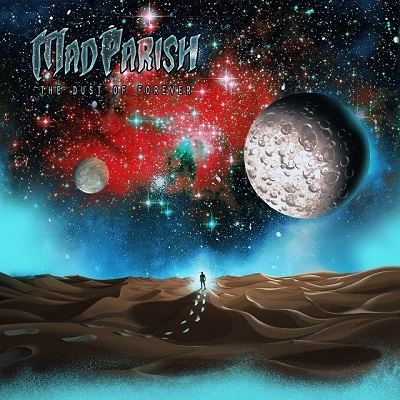SNOWY SHAW – “Why Be A Prostitute If You’re Not Even Getting Paid?”
November 24, 2020, 4 years ago
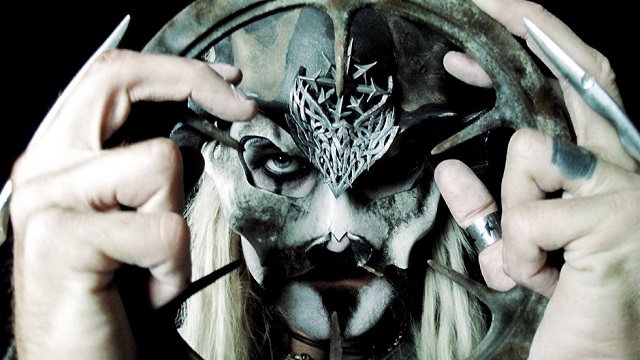
Look, it doesn’t matter that Snowy Shaw is not a huge name at the front of a big band… even though he’s been at the front of many drop-dead amazing bands and projects, best of which is/was my album of the year for 2018, White Is The New Black. Fact is that Snowy is a type of Devin Townsend or Steven Wilson force of nature, who has also, incidentally, been part of Mercyful Fate, King Diamond, Sabaton, Dream Evil, Memento Mori, Therion and Dimmu Borgir. Plus “Krampus” is the greatest Christmas carol of all time. And maybe the greatest video. Except for Snowy’s own “Nachtgeist,” which has to be seen and heard to be believed—a shinier diamond of a more perfect metal song there never was (Snowy does his own video work and is a skilled photographer as well).
And yes, on his solo album, he proves to have a shockingly versatile and interesting voice plus he plays all the guitar and bass along with (the expected) drums. In fact he plays everything on the whole album (other than guests on a few tracks), plus he wrote everything and produced the record.
I’m telling you all this because he’s just put out his autobiography, The Book Of Heavy Metal, a weighty tome that rises to the insane genius levels of his music projects—add in there Illwill and Notre Dame—clocking in at 444 never not entertaining pages of crushing honesty, continual humour and heartbreaking ups and downs everywhere on his mission to make ridiculously first-rate art but in a genre he sees as rapidly dying. There are illustrations, welcome change-up in typestyles, plus illuminating and revelatory photography everywhere in black and white plus colour sections, it’s hardcover and the page edges are painted black. Seriously folks, you will learn so much about what happens behind the scenes in extreme metal and you will never be bored—this might be his greatest feat, given the book’s word-packed 444 pages.
I so heartily recommend the damn thing (just go play the “Krampus” video if you need some sound and pictures to put with my sermon—you’ll be hooked) that rather than tell you at the end, well, here’s how to get it: steelcartel.com/snowyshaw, for US shipment, and if you want it beautifully signed and dedicated, snowyshaw.net.
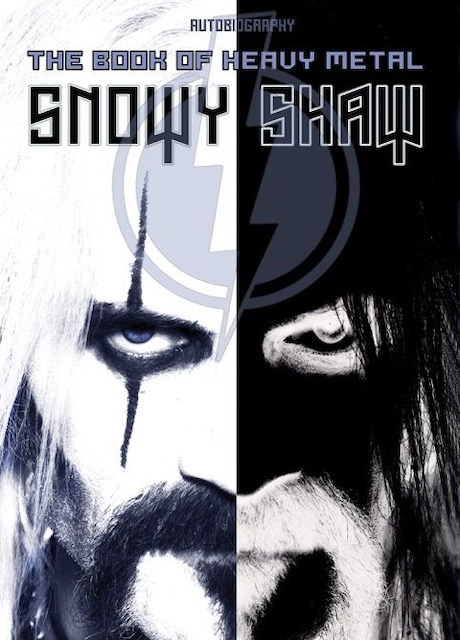
“As with everything I do, I try not to compare too much to anything else,” begins Shaw, asked why this is so God-damn nice for his first book. “I try to make it the way I would’ve wanted it if I was to buy it (laughs). To live up to my own standards. I mean, as you can see, I kind of decorated it with drawings and shit, spiders and cobwebs and all that crap. I don’t think I’ve seen anything like that, but that’s the way I would’ve wanted it.”
On the good reviews that are sure to come, Shaw brings up a good friend of BraveWords, proving what a small world heavy metal can be. “So far there hasn’t been that many, let’s say, book reviews from reviewers per se. But the reception with the buyers, with fans and all that, has been just exceptional. Like overwhelming, almost. But just recently, from MetalRules, Joshua Wood, he has a column just for books, a specific thing where he just writes about music books and autobiographies and this and that, and he was giving me the best review ever. He was saying that over this year he’s read over 80 biographies and my book was by far the best or something. And it should be the benchmark of how to write an autobiography. You couldn’t possibly ask for anything else than that, right?”
Hell yeah. Long time in the making though, says Snowy. “I’d say that it started out as a homemade sort of therapy, instead of jumping from the bridge or spending all my money going to a shrink over the last few decades or something like that—or doing that in the future. I figured that I’m such an ambassador for do-it-yourself, pretty much, that I have a problem with authority or following rules or doing what people tell me to do, that I figured that I had to get my head around this by myself, to come to terms with my inner demons or whatever the fuck it is. So I started writing about—this was after I turned 40, and I totally crash-landed—all the ups and downs in life, not just my career, so to speak, but personal stuff, when growing up and all that. And I realized after doing so 24/7, for four or five weeks or whatever, I started to feel a little bit better and I could distance myself from it.”
“I never kept a diary or journal or anything like that, but after that I decided, okay, let’s go back to life and touring and working with music and so on. But I could on the side keep a journal and write about all my reflections or my thoughts on whatever I’m going through. And eventually it came down to, maybe I should make this into a book. So it started out like therapy. Then I decided from day one that I should be brutally honest and tell the truth like it is. And to me it seemed that the timing for this, especially when the fucking COVID-19 happened and all that, the whole fucking scene is basically, you know, it’s dying or crash-landed or whatever you want to say. You need to have a book like that with someone who is telling the truth instead of this romanticized Hollywood fancy dream of The Dirt—sex, drugs and rock ‘n’ roll. I’m telling the back side of it, and behind the scenes. So I might be on MTV, Headbangers Ball, or headlining Headbangers festival with Mercyful Fate one day, and the next day I’m sitting outside of the unemployment office trying to get some fucking money (laughs). So there are two sides of the coin.”
“That’s my motto in life,” answers Shaw plainly, asked if his honesty across the action-packed pages of this book about how jerky people can be is going to burn him some bridges. “I don’t have a bad memory, obviously, because I wrote 444 pages of this (laughs), but it’s easier if you don’t tell lies. I don’t see any problem with being honest and telling the truth. I mean, it’s my truth, of course, but then if you ask Messiah (Marcolin, Memento Mori) for example, who winds up in a shit-storm here, maybe he has a different opinion about that. But I’m telling my truth. I don’t see how I could be any other way. I’m telling the stories the way they unfolded, and the way I reacted to them and the reason I handled it the way I did. If I would exclude specific points because I don’t want to hurt people’s feelings or whatever, then it wouldn’t make sense. I mean, I’ve got to fucking tell the truth and the truth hurts and not everybody can take that. So be it. I’m being very critical and open about my own shortcomings and flaws and mistakes and shit like that too.”
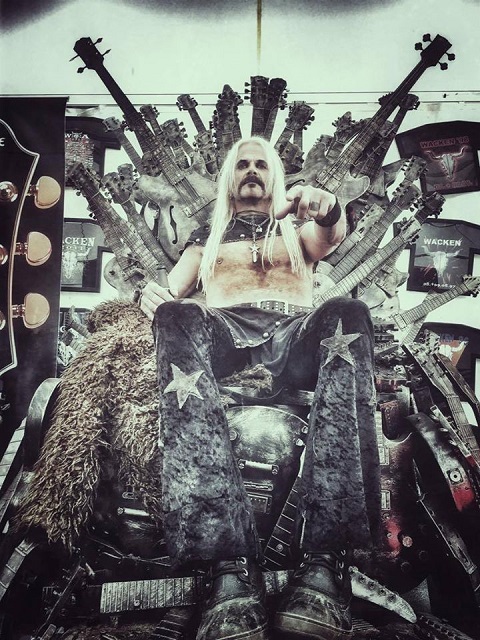
Built into the story time and time again is this narrative about people sucking at their jobs—the tour bus driver story is priceless—resulting in the idea that the industry can be a pathetic comedy of errors. “Yes,” laughs Snowy. “I’ve got to tell you, I mean, I don’t think I have this in the book, but when I first started, I think the second tour on the Conspiracy album, I had this American drum tech that I sort of inherited from Mikkey Dee. I don’t want to mention his name, but we didn’t get along so well. I mean, I was kind of green, and I told him, in my bad English and all that, I said, ‘I’m not that good at tuning the drums.’ And he said, ‘Hey, man, don’t worry, I will fucking kick ass in tuning the drums!’ And it turned out I was about twice as good as him. And I thought I didn’t know how. So sometimes you see the difference, even in cultures. We’re kind of low-key, I suppose, in Scandinavia, compared to cocky Americans, I suppose (laughs). What I’ve noticed, over time I developed into a very… what’s the word? Not self-centred, but individualistic—I can’t deal with a lot of things. There’s something in Scandinavia called the Law of Jante. It meets you shouldn’t think you are something. You shouldn’t think that you’re special or any better than anyone else. And I can see that with Yngwie Malmsteen (laughs). He had to fucking move, to be around entrepreneurs and people with ambition, people who believe in themselves.”
And so again, on the book front, “I’m just doing it to please myself, basically. I mean, I’m going to make one fucking autobiography in my life—I might as well do it good (laughs). The same thing with the music. What’s the point of just dishing out albums and trying to cash in? Cash in on what? You don’t earn any fucking money from this crap any longer. Just like I’m saying in some parts of the book: why be a prostitute if you’re not even getting paid? I could just please myself and do the best I can. At least I can be proud of what I have accomplished, and hopefully people like it and share my opinion on what quality should be.”
“To be honest, I have no fucking clue,” answers Shaw, asked about what his next project will be. “I just try to follow my heart. I figure if I do that, I can’t be led astray. That sounds kind of pompous, but White Is The New Black, I was writing in different directions, but it’s supposed to be the start of a six-album concept, something like that (Snowy had originally described it as a greatest hits album, before the original albums with those songs even existed!). I’m about to get back in the saddle and do that. But I kind of crash-landed on a private level, with so many things going on, I don’t really feel any obligations to deliver the goods. Especially in times like these. Still, I’m going to be focusing on making three albums now. But I might also reveal that I’m going to make an audio book out of this book now. That’s what I plan to do.”
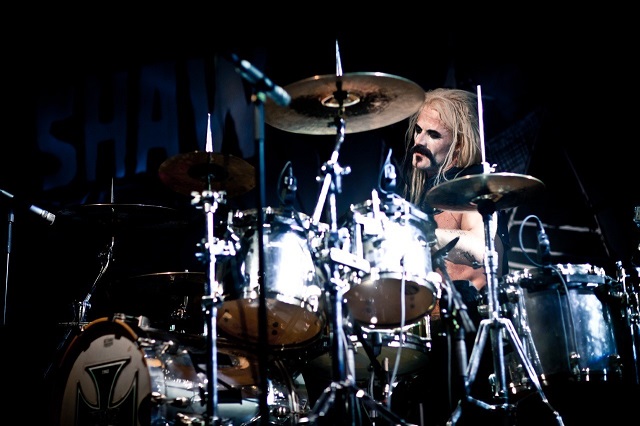
“But again I kind of came to a point, like in 2014 when I put out my live DVD, where I considered that like a break point. Okay, now it’s been 25 years, playing with a lot of bands, and now I’ve kind of fuckin’ had it. The next 25 years I’m going to go solo. I’ll do my own thing, come what may. But that doesn’t exclude me from doing session work and being involved in projects that I find interesting. Because I mean, that’s kind of the meaning of life: to develop and to show some self-improvement in whatever it is.”
Such optimism, even if it’s mainly falling out of the sense of ambition there, or at least the long-term forecasting. But as always—and as rendered hilarious time and again throughout the book—there’s the crushing weight of reality as well.
“It’s kind of prophetic, although I don’t know if that’s the word,” says Snowy, in closing. “But look at what happened—everything has come to a halt, in a way. I’ve got to say that, looking at it now, I surround myself with a lot of colleagues, and they say, ‘Oh, I can’t wait for this shit to be over and go back to normal.’ What do you mean normal? Like in January it still sucked, didn’t it? Because metal doesn’t sell any records anymore. And you have to be out on the road for 250 days per year to earn a living from it. And everybody is competing for the same little clique of audience. Because, I mean, there’s not a lot of youngsters getting into this, as I can see. It’s not the ‘80s anymore. It’s not popular in that sense. You know, the age range is like between 45 to 60 or something like that (laughs). They are the metal guys. I don’t want to paint the devil on the wall or whatever, but I mean, I don’t have an awfully positive view of the future here. I’ve been struggling, chasing my fucking rainbows my whole life, but the more I realize it, those things that I dreamt of as a kid, the thinner it gets. Yeah, I can cross things off my bucket list and all that, but if you want positive news, you’re asking the wrong guy (laughs).”

